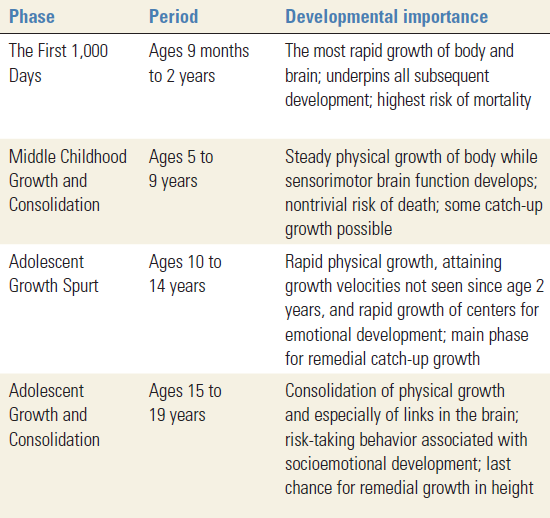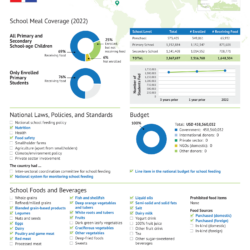Building the evidence: Early nutrition sets the stage; subsequent investment plays out across childhood
Blog by Dr. Ronald E. Kleinman, GCNF Board President and Emily Fredenberg, GCNF Senior Program Officer
The Crucial First 1,000 Days
The first 1,000 days of a child’s life—from conception to their second birthday—are a critical period for nutrition. During this window, appropriate nourishment lays the foundation for physical growth and development, neuro-cognitive development, and overall health.
We know that inadequate nutrition during this time can have lifelong consequences, stunting a child’s potential. But what about the childhood years that follow? While early nutrition undeniably shapes a child’s developmental trajectory, emerging evidence challenges the perception that a child’s developmental path has been fully determined within this window of time.

Sri Lankan school children at lunch time. Photo courtesy of the Ministry of Education of Sri Lanka.
The Next 7,000 Days
While optimal nutrition during the first 1,000 days of a child’s life profoundly influences their long-term development, access to proper nutrition throughout the first 8,000 days of childhood (until the age of 21) contributes substantially to a child’s potential and well-being in their adult years. The Biomarkers of Nutrition for Development-Knowledge Indicating Dietary Sufficiency (BOND-KIDS) project, led by the Eunice Kennedy Shriver National Institute of Child Health and Human Development (NICHD), seeks to better understand the impact nutrition plays on development throughout the remainder of childhood (or the next 7,000 days). Children in this age range experience a number of growth milestones, where adequate nutrition plays a critical role in a child’s physical growth, neurological development, and overall well-being.
Research from the Disease Control Priorities (DCP3) outlines three primary phases: Middle Childhood Growth and Consolidation (ages 5–9) when infection and malnutrition remain key factors in development; Adolescent Growth Spurt (ages 10–14), a period of significant increase in physical growth and behavioral change from puberty; and Adolescent Growth and Consolidation (ages 15-20) where the brain is further restructured and linked to behaviors related to experimentation and exploration.
Key Phases of Child and Adolescent Health and Development

Source: Disease Control Priorities (DCP3), Re-Imagining School Feeding: A High-Return Investment in Human Capital and Local Economies, 2018.
Nourishing Minds, Fueling Futures
Continued investments throughout the first 8,000 days will help sustain the positive nutrition gains from early years and play an important catch-up role for undernourished infants and children. Research from the BOND-KIDS Project and DCP3 builds the evidence base that while early nutrition sets the stage of a child’s life, the subsequent years are also vital and require sustained investments in nutrition throughout childhood.

South: London School of Hygiene and Tropical Medicine. Improving Diets and Nutrition Among the Neglected Age Group of Middle Childhood (children aged 5-9 years), 2020.
Nutrition safety net programs such as school meals provide an opportunity to improve nutrition and enhance learning outcomes for school-age children, and should be prioritized investments. In certain contexts, a school meal can compel families to send their children to school. This meal also provides a teachable moment on good nutrition to help shape lifelong dietary patterns and plays a vital role in breaking the cycle of malnutrition.
About the Authors:
Dr. Ronald E. Kleinman is the Board President of GCNF and the Physician in Chief Emeritus of the Massachusetts General Hospital for Children, Emeritus Chair of the Department of Pediatrics at Massachusetts General Hospital, and the Charles Wilder Distinguished Professor of Pediatrics at Harvard Medical School. Dr. Kleinman’s major areas of research interest include nutrition support of infants and children, nutrition and public health policy, and gastrointestinal immunology. He has been a member of several committees and projects of the National Institute of Child Health and Human Development and the National Academies of Science, Engineering and Medicine, including the NASEM committees on Standards for School Meals and Obesity Prevention for Young Children. He served as Chair of the Committee on Nutrition for the American Academy of Pediatrics and as Vice-Chair of the 2020-25 US Dietary Guidelines Advisory Committee.
Emily Fredenberg is a senior program officer at GCNF and brings ten years of experience in program management, communications and partnerships in the global food security and nutrition space. Emily spent six years with the United Nations World Food Program (WFP) in Rwanda, Lebanon and Italy. During this time, she helped to launch and manage a national school meal program in Lebanon and led WFP’s communications efforts to help expand Rwanda’s home-grown school meal program towards national coverage. Prior to GCNF, Emily was at The Rockefeller Foundation where she managed a portfolio of grants supporting global food security and nutrition.













No comment yet, add your voice below!